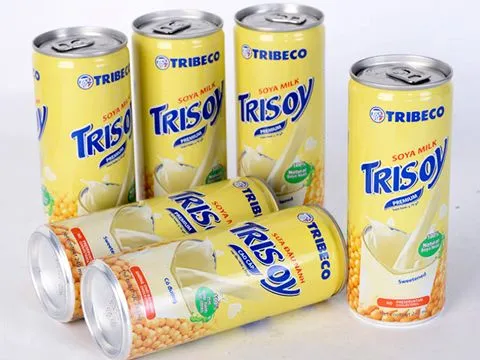
However, despite the presence of these strong strategic investors, TRI was unwillingly pushed to the brink of bankruptcy, instead of developing into a leading beverage brand in Vietnam.
The Golden Age
The Saigon Beverage Joint Stock Company was established in 1992 with a charter capital of VND 8.5 bn, of which the state owned 51% stake. By 1999, TRI was equitized after state shareholders transferred 51% of capital to investors. Soon after that, TRI made great leaps in production and business, with soymilk and carbonated soft drinks selected by the People's Committee of Ho Chi Minh City as a main local industrial product. The Tribeco brand was also voted by consumers as the best quality Vietnamese product for eleven consecutive years. At that time, TRI created its own brand image by sponsoring the bike race for the Ho Chi Minh City Television Cup continuously for many years. This was a marketing promotion that was highly appreciated by economists at that time.
In 2001, TRI became the ninth enterprise to list stock on HOSE. With its strong brand name and image, besides a double digit dividend payment, TRI quickly became the focus of attention of many domestic and foreign investment funds, including domestic organizations such as Citigroup Global Market Ltd (CGML), Citigroup Global Market Financial Product Ltd (CGMFP), VinaCapital, PXP Vietnam Fund, Vietnam Investment Limited, Uni President, and the Kido Group (formerly known as Kinh Do Group).
In 2005, Kinh Do, one of the strongest confectionery brands in the domestic market, showed an interest in expanding into the soft drinks business. For this purpose, it chose to invest in TRI by buying a 35% stake. Tran Le Nguyen, General Director of Kinh Do at that time, said that building a new brand name for an entirely new beverage company would take a lot of time, and would require opening of several new distribution channels to promote the products, hence investing in TRI was the best and most logical solution.
Kinh Do's goal was to help TRI sales increase by 30%/year and 100% in three years. When talking about this deal, Nguyen Xuan Luan, General Director of TRI at that time, believed that it was a mutually beneficial decision. He said that if TRI did not cooperate in promoting development, it would soon be lost to foreign competitors. In fact, with the participation of Kinh Do, TRI made some bold investment decisions in 2006 and 2007 such as putting in operation two new factories, Tribeco Binh Duong and Northern Tribeco (Hung Yen).
Continuous losses
After selling to Kinh Do, TRI sold 15% of its shares to strategic shareholder Uni President, and Uni bought more than 43% of TRI stake. It was expected that with the presence of Taiwan's leading food group, TRI would continue to make more impressive progress. But the results were quite the opposite, and the reasons were previous unrealistic ambitious investment decisions. The first calamitous decision was to invest in two new factories in Binh Duong and Hung Yen with 80% capital contribution by TRI and 20% by Kinh Do. Both these factories had chartered capital, so TRI had to promote loan mobilization.
According to statistics, TRI liabilities, mostly in short-term loans, increased from VND 89 bn in 2005 to VND 150 bn in 2006 and approximately VND 500 bn by 2007. The burden of loan interest was the main reason why TRI first saw a serious loss in 2008. At the end of 2008, TRI equity was negative at VND 5 bn, especially the debt to total capital ratio was nearly 99%. Within two consecutive years, 2010 and 2011, TRI had to sell the two factories to pay off its debts. By the end of 2011, TRI accumulated loss was upto VND 312 bn, and equity was negative at VND 26 bn. At this time, Kinh Do decided to withdraw from TRI.
In these difficult times, the TRI Board of Management along with representatives of its strategic investors, made many blunders. For example, instead of advertising before setting up a sales distribution channel, TRI decided to build a distribution channel before promoting product marketing. It is worth mentioning that at that time, TRI competitors had strongly risen in the market due to aggressive marketing activities.
Sad memories for investors
At that time, even if the Board of Management had not proactively cancelled the listing, TRI would still have been forced to cancel its listing due to negative equity. With the announcement of its business dissolution, more than 27.5 million TRI shares were officially delisted on HOSE from 10 April 2012. To ensure the interests of shareholders, TRI bought back shares from investors at a price of VND 2,300/share, calculated at an average price in the last 60 trading days. After the decision to dissolve, all activities at TRI were transferred to Tribeco Binh Duong, a 100% foreign-owned company of Uni President. Hence, after just 20 years, the Tribeco brand was fully transferred to foreign partners.
In the beverage market, Tribeco is a tragic story of the end for one of Vietnam's leading brands. In the stock market, TRI is a sad memory among the first stocks listed on HOSE. Although trading for only a little more than eleven years, TRI has left many memories in the minds of several of its investors, especially the first investors who participated in the stock market. TRI was listed on 28 December 2001 at a closing price of VND 29,000/share. The ultimate peak for TRI was established in the trading session on 23 March 2007 at VND 61,000/share.




















